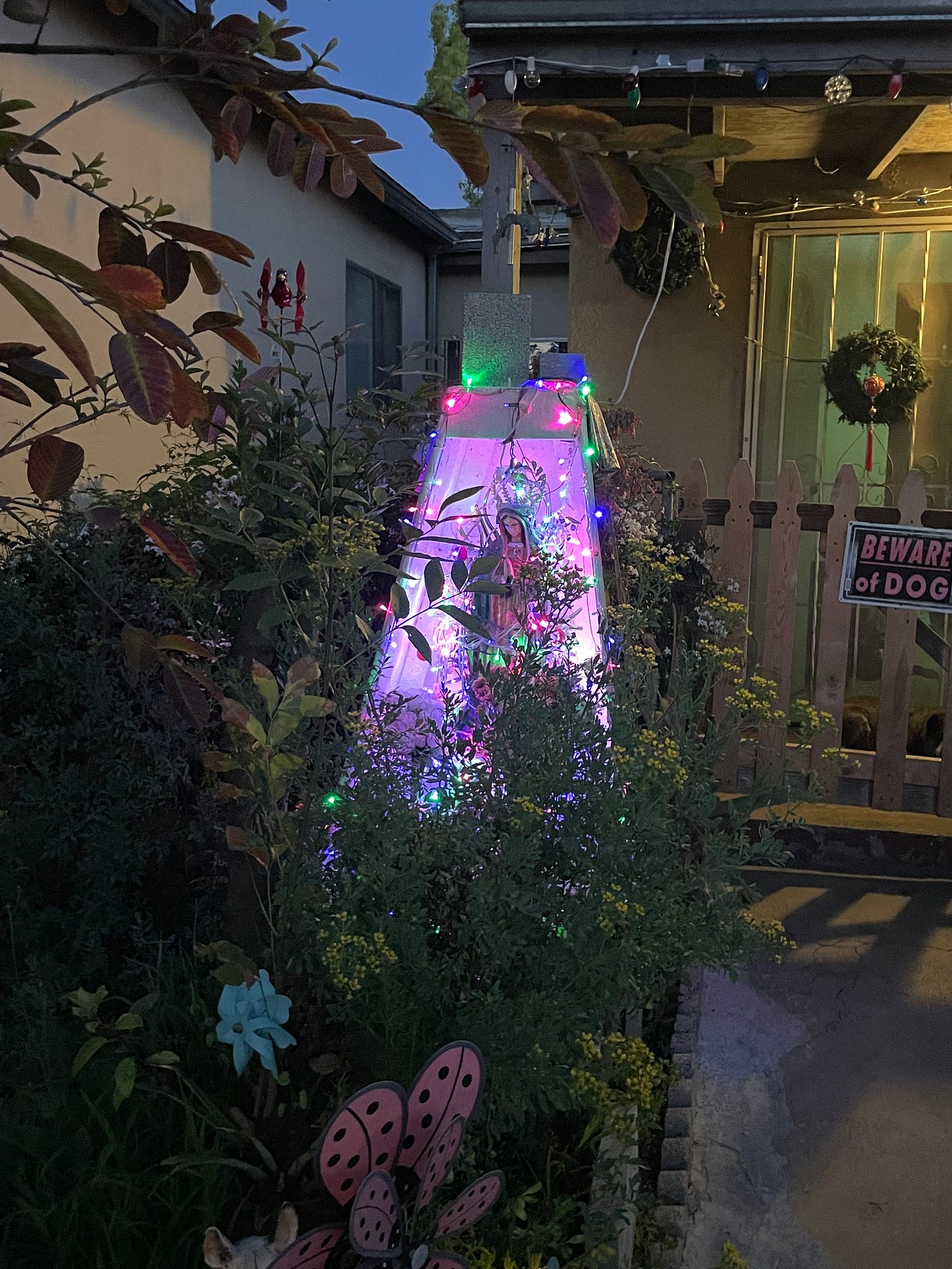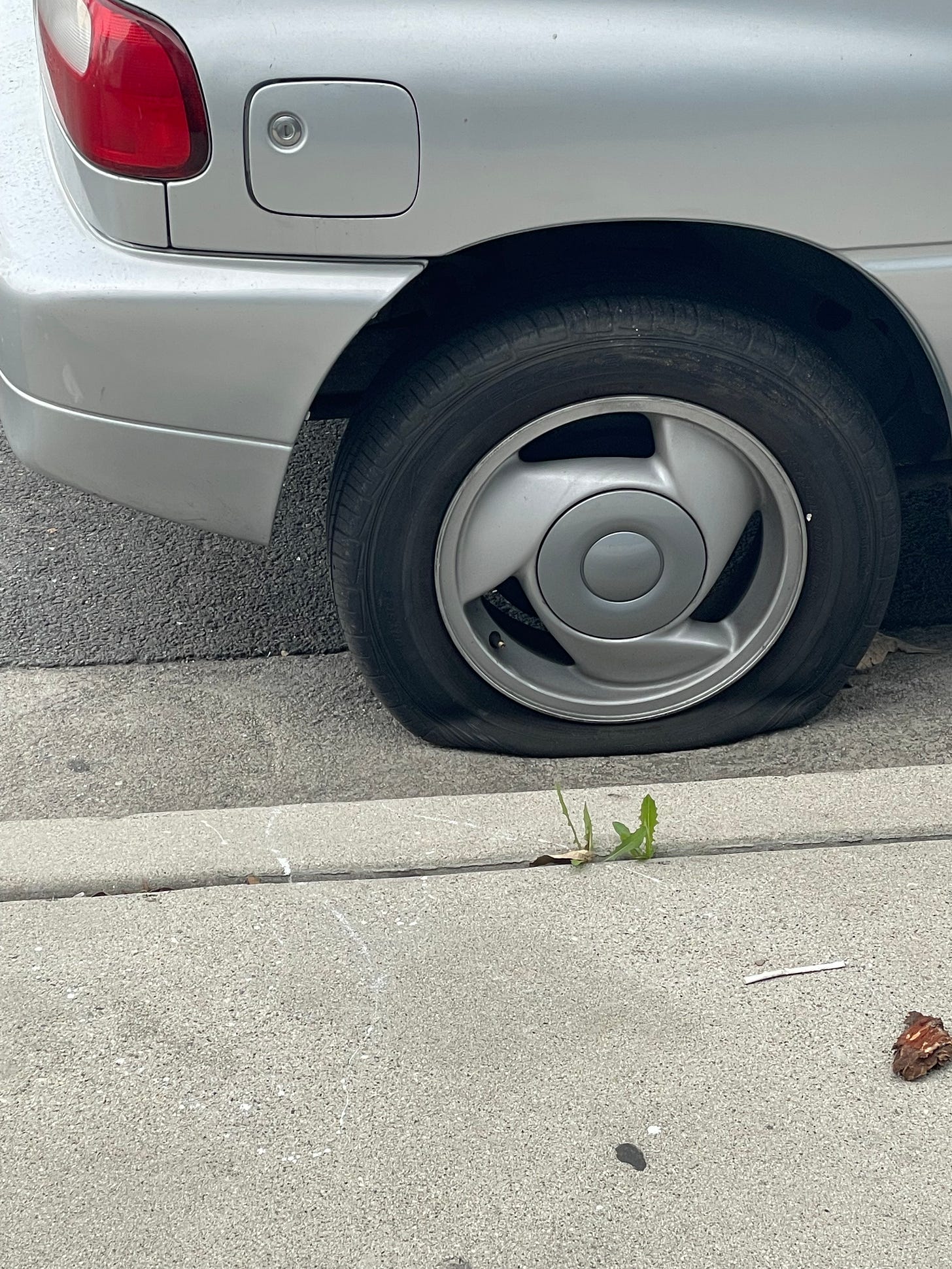relent
on 40 days and 40 nights in a desert
No one knew in advance that it was the Pope’s last day on Earth. Easter Sunday, 4/20, and the final day of Coachella gathered together under the firmament. Little bells of significance chimed, but there were no warning alarms, no sacred chords, no gongs. I woke up to chirping birds, a shining sun, and a big, blue sky. Two pearl necklaces and a white skirt to my ankles, I donned my Sunday best. I lingered in my driveway, perusing Spotify for the first time in 40 days. I sailed down Beverly Blvd. underscored by a song I had never heard before. Lyrics about driving L.A. from the East side to the beaches drew a smile: wry, then sincere. For the first time in 40 days, I felt something like happiness on the way to work. Lapsed Catholic that I am, vestigial guilt made the joy permissible.
I gave something up for Lent this year, though I never set foot in a church all the while. And yet, I can’t recall a year from my churchgoing career when I honored my Lenten sacrifice as rigidly. I sacrificed chocolate, for example, during my 13th Lent, only to take advantage of every loophole I could find to let myself eat chocolate. White chocolate isn’t technically chocolate! I justified as I snuck handfuls of the stuff. Someone at school said that Sundays didn’t count, so I gnawed on chocolate chips every Sunday. And if someone brought in a treat to share with the class? Well, I would’ve been stodgy to refuse. My life was better with chocolate in it. “Life” had begun to reveal itself as a mechanized hammer, pounding, eyeless and punitive. Even as a child, my shoulders rounded under unseen weight. It felt downright nihilistic to willingly sacrifice one of the few things I truly enjoyed.
Ritual holds no space for surprises. Burn the same incense, don the same robes, chant the same words. Do it because you should, not because you feel like it. Somewhere in the tried, they say, lies the true. God is waiting within. The ritual is a path, already paved. Tread the path most-traveled-by.
Approaching my 24th Lent, I came to the understanding that I was due for a sacrifice. This was not a belabored decision, and I probably only did it because it came to me as a whim instead of a duty. As Ash Wednesday approached, I challenged myself to find something I could stand to lose. I felt compelled to discover whether, at the end of 40 days, the loss would have wrought any purification.
I considered my favorite medicines. I hadn’t been drinking or drugging all that much, I’d been treating food like a sensitive and precarious fuel, and I wasn’t purchasing anything I couldn’t justify. But I listened to music in the car. I sang along to it, I bobbed my head, and I sometimes even shed a tear. Here was something as unessential and life-affirming as chocolate. It brought me windswept, sunset, teenaged bird-freedom. And so, it had to go.
The more people you tell you’re going to run a marathon, the more likely you are to run the marathon. In this spirit, I announced to an assortment of friends, family, and others that I was abstaining from playing music in the car. Reactions were similar.
So, what, are you listening to podcasts?
To which, I would respond: No, just — (and here I would gesture, indicating silence).
My interlocutors shuddered and imagined the desperation that such austerity would engender in themselves, were they in my driver’s seat. They imagined they’d cry more frequently, unable to bear such pinching proximity to their own thoughts. I’d nod and not say anything, and the subject would drop. Internally, I’d absorb a classic Catholic ego boost. I am holier than thou. I can endure.
All this to say, I did suffer. Maybe the silence was to blame (or to thank) for the plentiful car issues that befell me, poison manna in my aural desert. I blew out my right rear tire on a rainy night in Burbank. I paid through the nose for tows, repairs, and, more unexpectedly, a new set of brakes. When all that was done, I continued hearing worrisome creaks. I returned to the mechanic, who quoted me an astronomical bill for repairs to my suspension system, as well as replacements for the other three tires I hadn’t already blown out. Gone were the days when getting behind the wheel made me feel like an American exceptional, Thelma and Louise squeezed into one body. That kind of freedom was the Protestant kind, nailing 95 Theses to the door or having sex with a chained cross around your neck. Mine was the monastic experience, a penitent’s vow of silence. Every creak, every shudder, every pothole was a flagellation. Mea culpa, mea culpa, mea culpa.
Maybe it was the hand of God that rammed my tire into that Burbank curb, forcing me to fix what would’ve broken regardless. Maybe that same hand guided my own unwitting one towards two titles sourced from the same poem during my most recent visit to the bookstore: Joan Didion’s Slouching Towards Bethlehem and Chinua Achebe’s Things Fall Apart, both quoting W. B. Yeats’ “The Second Coming.” I read them quickly, these Lenten books, creaking on the edges of collapse. When both authors observed their native milieus, they found societies dispersing into myths, twin incarnations of Yeats’ rough beast1 — the titular second coming of Christ, which believers should long for and sinners should fear. Didion explains in her book’s preface how Yeats’ lines reverberated in [her] inner ear as if they were surgically implanted there.2 Her experience in the Haight-Ashbury district was the first time [she] had dealt directly and flatly with the evidence of atomization, the proof that things fall apart.3 That line from which Achebe sources his title — straightforward, almost to the point of thesis — has been echoing in my inner ear, too: Things fall apart; the centre cannot hold.4 My boss almost quoted it to me on accident, trying to relate to my car troubles. Things break down, he said instead, reflecting on his own old Prius, long-since switched out for a Tesla.
Things break down, indeed. Elsewhere in this same 40-day stretch, my laptop refused to turn on. A vertical, swooping scratch appeared as a faint slash down my formerly even phone screen. My record player began running slightly slower, maddening. The collar began to tear off of my favorite sweater, and my new pants dyed my old shirts gray in the wash. In the Year of the Snake, skin demands to be shed.
Maybe, when Jesus went to the desert for 40 days and 40 nights, he did it because he wanted the Devil to tempt him. He wanted to be offered better than he had, if only to reject it. He wanted to miss delicious things, to long for them, salivate. He wanted to feel the hunger, the thirst, the sun cooking his skin into leather. He wanted snakes and buzzards, the flat white-orange canvas stretched beyond the horizon. He wanted his influence to meet oblivion. He wanted enough silence and boredom for his wicked thoughts to develop three dimensions, his prayers to fall on fallow land.
And maybe, when the Devil came to Jesus, he really wanted to lighten the load. Maybe he knew that the suffering was needless, a showboat test of strength. Maybe the Devil looked at Jesus and saw, not the smoldering of omniscient purpose, but the broken carriage of a prisoner braced with the robotic duty of his warden. Maybe the Devil felt something like sympathy: Jesus — like the Devil, once — didn’t want to be saved.
While we penitents purge, sanctifying ourselves with solipsism, the rest of the world continues to run smoothly, with all of its parts intact. When we insert ourselves back into our contexts, fresh pinballs loaded back into the machine, we are rudely and immediately reminded, from the levers’ first bang-smack-drop, that no amount of inner work can absolve us beyond the battery of our artifice.
But, remember: the desert is forever. You can always crawl back and stretch out on the everlasting dunes, dry yourself to the bone. When you want to feel holy again, you know where to find it.
A refrain from the Sacrament of the Eucharist intones: Christ has died, Christ is risen, Christ will come again. The melody is insistent, straightforward. Time marches forward on a linear path, through three verb tenses. There is no other outcome. Accept it. Pray that you’ll be among the sheep and not the goats when the Judgment Day finally arrives.
Back in the real world, a kid rams a pinball machine against the wall until the glass cracks, and the arcade owner puts an out-of-order sign on it. The kid rides his bike home early and catches the first long sunset of the springtime. The owner never bothers with properly replacing the pinball machine, and the child stops going to the arcade anyway, because he plays video games now. He loses track of how long the sun stays bright each day. The pinballs miss the bang-smack-drop, but this story has long since ceased to be about them.
William Butler Yeats, “The Second Coming,” Collected Poems, (New York: The Macmillan Company, 1924), 158.
Joan Didion, Slouching Towards Bethlehem, (New York: Farrar, Straus and Giroux, 1968), xi.
Didion, Slouching Towards Bethlehem, xi.
Yeats, 158.





